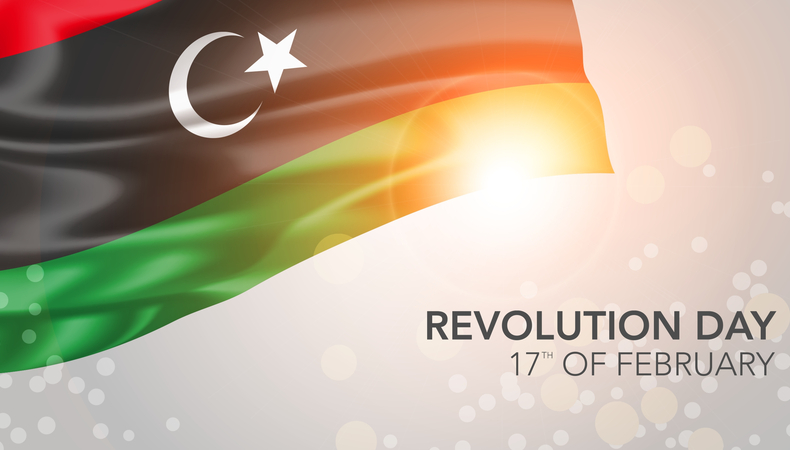Although there is little to celebrate, Libyans rejoice the 10th anniversary of the 17 February’s revolution

Libyans today celebrate the tenth anniversary of the 17thFebruary revolution. Thousands gather in most city squares across the country, particularly in the Martyrs’ square in Tripoli and the center of Misurata. The revolutionaries who fought against Muammar Gaddafi’s regime in 2011 raise the flags of independence, chanting in the name of the revolution that overthrew the colonel’s regime, after having ruled the North African country for over 42 years.
In a speech on Tuesday evening, the outgoing president of the Tripoli-based Presidential Council, Fayez Al-Sarraj, congratulated the Libyans, recalling that the revolution is “an important positive change in the modern and contemporary history of Libya, and Libyans will not neglect it.” The anniversary this year comes after two important milestones have been reached, the first is the end of the war with the agreement of all parties to a ceasefire, the second is the political dialogue that under the auspices of the United Nations has chosen a new executive authority, composed of a president and two deputies of the Presidential Council, and head of government, through the voting system of the lists in the last dialogue sessions that took place in Geneva on February 5.
The new authority will lead a preliminary phase that will end with the organization of the general elections scheduled for December 24, 2021, according to the roadmap issued by the Libyan political dialogue (LPDF). The choice of the new executive authority was widely and quickly accepted by the United Nations, and by the international community.
The celebrations are taking place amid controversy and security incidents, such as in Sabha, in the southern region, where clashes and injuries have been reported. As in the last five years, controversy also arises over whether Libyans are excited to celebrate this occasion due to the difficult life situation, the services crisis represented by the continuous long power outages, the acute lack of liquidity in the banks, high prices and the deterioration of the price of the Libyan dinar, the lack of fuel, and the invasion of foreign forces on their territory.
Libyans have mixed views on this issue between those who support the celebration and those who oppose it. Supporters separate the revolution, which they believe has achieved its goal of ending a dictatorial regime that has ruled the country for more than four decades, in which freedoms have been stifled and modern state institutions dismantled, from the current failure state. Among those who accuse the previous regime of the current tragedy that sees over 500,000 people displaced, and those who regret the past safety and glory of the Libyan state.
Although there is little to celebrate, the spontaneous demonstrations represent a new cry for freedom. They represent the desire of millions of Libyans to complete the revolution, building a modern and democratic state for all. Despite discontent with the state of their country and the ruling political class, the celebrations of February 17 reflect their adherence to the principles of the 2011 revolution, with the hope that the era of chaos will end soon.
The Libyans are calling for security to be restored, unifying military institutions, and reactivating police stations that are still closed in many cities. They want the displaced to return to their homes and the problems of everyday life to be solved. This year’s celebrations are an invitation to the new executive and the international community to work seriously for the supreme good, that of their country.




